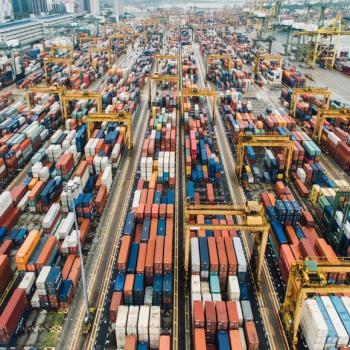(Originally published in September 2014 at the KPN Resources blog.)
 I recently was asked a truly startling question while giving a talk on the church and economics. It was a question that shows how some efforts to speak out for justice can actually undermine justice. If we misidentify the source of injustice, we will not only fail to fight it, but may actually become its unwitting accomplices.
I recently was asked a truly startling question while giving a talk on the church and economics. It was a question that shows how some efforts to speak out for justice can actually undermine justice. If we misidentify the source of injustice, we will not only fail to fight it, but may actually become its unwitting accomplices.
I had argued that in spite of the serious challenges it creates, the entrepreneurial economy is on balance a good thing for both our spiritual and material well-being. Compared with what came before, the economy produced by the Industrial Revolution does a better job of honoring the dignity of the ordinary worker and teaching people to love their neighbors across cultural boundaries. That’s because the Industrial Revolution itself was catalyzed by the church’s influence on culture and institutions.
Someone asked how I would respond to the charge that my view amounts to “colonialism” because “the people in Ferguson, Mo., and places like that aren’t able to participate in this economic system you’re describing.” Communities like Ferguson certainly do represent a deep challenge for those of us who are concerned about justice and economic flourishing. I’ll say something about that in a moment. But first, let’s stop and think about what this person was saying.
His comment is very revealing. The view he asked me to respond to was not centered on opposition to particular injustices that might be preventing the people of Ferguson from flourishing economically. Extending rights and dignity to the poor so they could participate in the economy the way others do was precisely what I had been advocating in my talk. Yet this person rejected what I was offering; he proposed that fighting for the rights of the poor to work and become self-supporting participants in the modern, entrepreneurial economy was “colonialism.”
How does this person think about the human beings who live in Ferguson? He isn’t thinking about the people of Ferguson as image-bearers who are capable of doing work that adds value to their community. If he did, he wouldn’t say that treating them as such image-bearers is “colonialism.” He – or at least the hypothetical person whose view he was asking me to respond to – is thinking of them as helpless dependents who cannot have agency in their own lives, cannot be stewards of the world alongside people like you and me.
This way of thinking about people who are materially impoverished is the starting point for almost all forms of economic injustice. It is the buried assumption in our culture that contributes to almost all of the problems our poor neighbors face. It is the reason that so many of the church’s efforts to help the poor are ineffective and even harmful. It is the primary obstacle to the emergence of more constructive approaches. And it is slowly moving us toward a permanent two-tiered society.
There do appear to be real injustices happening in Ferguson. The criminal justice statistics and other indicators do not paint a picture of a police and court system that is going after genuine criminals while safeguarding the peaceful public. There is at least some evidence suggesting that public institutions may not be governing in the interests of the community, but seeking to maximize the amount of money they can extort from people through abusive practices. The conduct of the Ferguson police since the shooting has not inspired confidence, either.
Joining with the poor to fight for their economic rights – their right to work, own, buy and sell, save up, and build something for themselves without having it stripped away by the powerful – is almost always one of the most important things we can do. But it is not the only thing. Churches can become engines of job creation, bringing together the entrepreneurs, workers, investors, and other constituencies needed to form new businesses.
Now the question is: which church is going to do these things? The church that thinks the people of Ferguson are not capable of participating in the entrepreneurial economy, are not capable of serving alongside us as stewards of the world, are not capable of achieving all that the opportunities of the modern world have to offer them? Or the church that thinks they are?
It is precisely because, and only because, the church believes that the people of Ferguson are capable of participating in the entrepreneurial economy that the church will care about their rights. Once we start thinking of the poor as dependents who cannot support themselves, we become unconscious but very real allies of their oppressors. This person’s question could almost have been invented in a laboratory to demonstrate the danger of thinking about justice as something that rich white people steward on behalf of poor black people, rather than something we all create together as responsible stewards in community.












